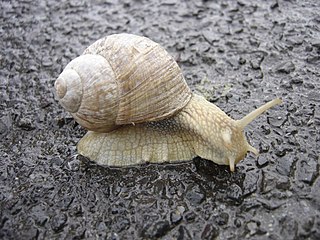
A snail is, in loose terms, a shelled gastropod. The name is most often applied to land snails, terrestrial pulmonate gastropod molluscs. However, the common name snail is also used for most of the members of the molluscan class Gastropoda that have a coiled shell that is large enough for the animal to retract completely into. When the word "snail" is used in this most general sense, it includes not just land snails but also numerous species of sea snails and freshwater snails. Gastropods that naturally lack a shell, or have only an internal shell, are mostly called slugs, and land snails that have only a very small shell are often called semi-slugs.

The gastropods, commonly known as snails and slugs, belong to a large taxonomic class of invertebrates within the phylum Mollusca called Gastropoda.
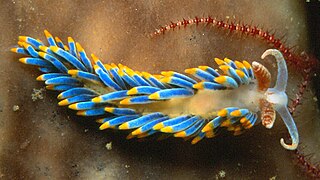
Nudibranchs are a group of soft-bodied, marine gastropod molluscs which shed their shells after their larval stage. They are noted for their often extraordinary colours and striking forms, and they have been given colourful nicknames to match, such as "clown," "marigold," "splendid," "dancer," "dragon," or "sea rabbit." Currently, about 3,000 valid species of nudibranchs are known.

The clade Anaspidea, commonly known as sea hares, are medium-sized to very large opisthobranch gastropod molluscs with a soft internal shell made of protein. These are marine gastropod molluscs in the superfamilies Aplysioidea and Akeroidea.

Sea slug is a common name for some marine invertebrates with varying levels of resemblance to terrestrial slugs. Most creatures known as sea slugs are actually gastropods, i.e. they are sea snails that over evolutionary time have either completely lost their shells, or have seemingly lost their shells due to having a greatly reduced or internal shell. The name "sea slug" is most often applied to nudibranchs, as well as to a paraphyletic set of other marine gastropods without obvious shells.

Opisthobranchs is now an informal name for a large and diverse group of specialized complex gastropods which used to be united in the subclass Opisthobranchia. That taxon is no longer considered to represent a monophyletic grouping.

Sacoglossa, commonly known as the sacoglossans or the "sap-sucking sea slugs", are a clade of small sea slugs and sea snails, marine gastropod mollusks that belong to the clade Heterobranchia. Sacoglossans live by ingesting the cellular contents of algae, hence the adjective "sap-sucking".

The mantle is a significant part of the anatomy of molluscs: it is the dorsal body wall which covers the visceral mass and usually protrudes in the form of flaps well beyond the visceral mass itself.

Kleptoplasty or kleptoplastidy is a symbiotic phenomenon whereby plastids, notably chloroplasts from algae, are sequestered by host organisms. The word is derived from Kleptes (κλέπτης) which is Greek for thief. The alga is eaten normally and partially digested, leaving the plastid intact. The plastids are maintained within the host, temporarily continuing photosynthesis and benefiting the predator. The term was coined in 1990 to describe chloroplast symbiosis.

Glaucus atlanticus is a species of small, blue sea slug, a pelagic aeolid nudibranch, a shell-less gastropod mollusk in the family Glaucidae.

Sea snail is a common name for slow moving marine gastropod molluscs usually with visible external shells, such as whelk or abalone. They share the taxonomic class Gastropoda with slugs, which are distinguished from snails primarily by the absence of a visible shell.
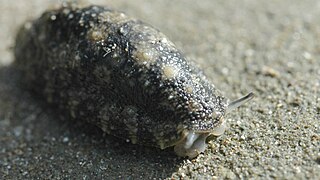
Onchidiidae are a family of small, air-breathing sea slugs. They are shell-less marine pulmonate gastropod molluscs. Onchidiidae is the only family within the superfamily Onchidioidea.

A rhinophore is one of a pair of chemosensory club-shaped, rod-shaped or ear-like structures which are the most prominent part of the external head anatomy in sea slugs, marine gastropod opisthobranch mollusks such as the nudibranchs (Nudibranchia), Sea Hares, (Aplysiomorpha) and sap-sucking sea slugs (Sacoglossa).

Slug, or land slug, is a common name for any apparently shell-less terrestrial gastropod mollusc. The word slug is also often used as part of the common name of any gastropod mollusc that has no shell, a very reduced shell, or only a small internal shell, particularly sea slugs and semislugs.

Nembrotha cristata is a species of colourful sea slug, a polycerid nudibranch, a marine gastropod mollusk in the family Polyceridae. This species of sea slug is black with green markings; adults are around 50 mm in length, and they live on rock or coral reefs in the tropical Indo-West Pacific Ocean.

Juliidae, common name the bivalved gastropods, is a family of minute sea snails, marine gastropod mollusks or micromollusks in the superfamily Oxynooidea, an opisthobranch group. These are sacoglossan (sap-sucking) sea snails, and many of them are green in color.
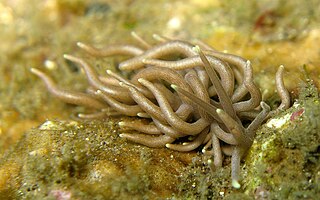
Phyllodesmium is a genus of predatory sea slugs, aeolid nudibranchs, marine gastropod molluscs in the family Facelinidae.
William B. Rudman, usually known as Bill Rudman, is a malacologist from New Zealand and Australia. In particular he studies sea slugs, opisthobranch gastropod molluscs, and has named many species of nudibranchs.
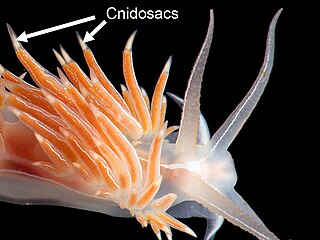
A cnidosac is an anatomical feature that is found in the group of sea slugs known as aeolid nudibranchs, a clade of marine opisthobranch gastropod molluscs. A cnidosac contains cnidocytes, stinging cells that are also known as cnidoblasts or nematocysts. These stinging cells are not made by the nudibranch, but by the species that it feeds upon. However, once the nudibranch is armed with these stinging cells, they are used in its own defense.

Terrestrial molluscs or land molluscs (mollusks) are an ecological group that includes all molluscs that live on land in contrast to freshwater and marine molluscs.



















